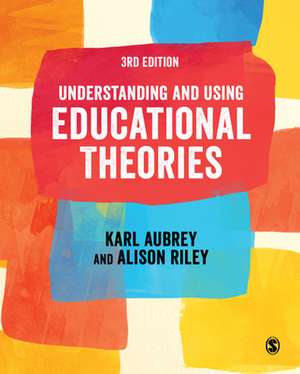Understanding and Using Educational Theories
Autor Karl Aubrey, Alison Rileyen Limba Engleză Paperback – 20 mar 2022
Each chapter includes practical examples showing how theories can be used to inform classroom teaching, and critiques of each theorist exploring opposing viewpoints and the strengths and weaknesses of different ideas.
This third edition includes:
- New chapters on Barak Rosenshine and Daniel Goleman
- Revamped reflective tasks with a greater practical focus for the classroom
- More models and theoretical diagrams throughout
Karl Aubrey has recently retired from his post at Bishop Grosseteste University.
Alison Riley is the Programme Leader for the BA Early Childhood Studies at Bishop Grosseteste University.
| Toate formatele și edițiile | Preț | Express |
|---|---|---|
| Paperback (1) | 238.05 lei 3-5 săpt. | +30.88 lei 4-10 zile |
| SAGE Publications – 20 mar 2022 | 238.05 lei 3-5 săpt. | +30.88 lei 4-10 zile |
| Hardback (2) | 581.94 lei 38-44 zile | |
| SAGE Publications – 19 noi 2015 | 581.94 lei 38-44 zile | |
| SAGE Publications – 20 mar 2022 | 710.09 lei 6-8 săpt. |
Preț: 238.05 lei
Nou
45.55€ • 47.68$ • 37.91£
Carte disponibilă
Livrare economică 10-24 martie
Livrare express 21-27 februarie pentru 40.87 lei
Specificații
ISBN-10: 1529761301
Pagini: 408
Dimensiuni: 186 x 232 x 29 mm
Greutate: 0.7 kg
Ediția:Third Edition
Editura: SAGE Publications
Colecția Sage Publications Ltd
Locul publicării:London, United Kingdom
Cuprins
Maria Montessori: Liberating the Child
Jean Piaget: Understanding the Mind of the Child
Lev Vygotsky: An Early Social Constructivist Viewpoint
B.F. Skinner: The Father of Operant Conditioning
Benjamin Bloom: Learning Through Taxonomies
Malcolm S. Knowles: Contextualising Adult Learning
Jerome Bruner: An Evolution of Learning Theories
Albert Bandura: Learning Through Observation
Urie Bronfenbrenner: The Ecology of Human Development
Paulo Freire: Oppression, Freedom and Critical Approaches to Education
Donald Schön: Reflection and Learning
David Kolb: Experiential Learning Theory
Jean Lave and Etienne Wenger: Socially Situated Learning and Communities of Practice
Barak Rosenshine: Principles of Instruction
Daniel Goleman: Emotional Intelligence
Guy Claxton: Learning Power
Dylan Wiliam: Assessment for Learning
Carol Dweck: Mindsets and Motivation
Notă biografică
Karl Aubrey is a Visiting Tutor on the Professional Studies in Education programmes at Bishop Grosseteste University. Prior to this Karl was the Programme Leader for a range of initial teacher education and professional development programmes at a large city further education college. Between 2003 and 2005 he was seconded to the DfES Standards Unit as a learning and teaching practitioner in the East Midlands. Karl has contributed to the Oxford Dictionary of Education. His doctoral thesis explored the reforms in further education teacher education from 2000 to 2010, from the viewpoint of teacher educators. Karl¿s research interests include inclusion, education policy, pedagogy and work-based learning.
